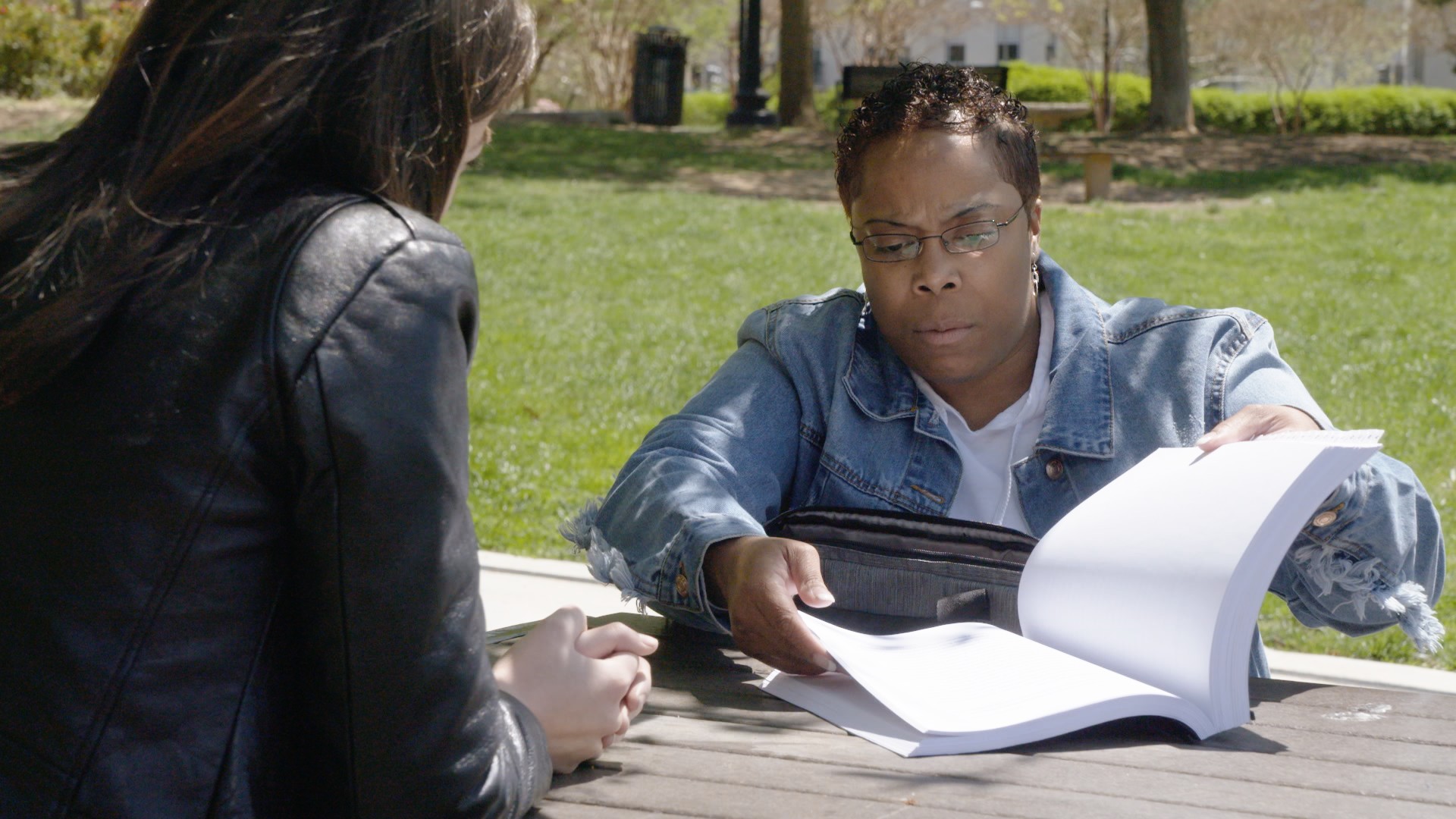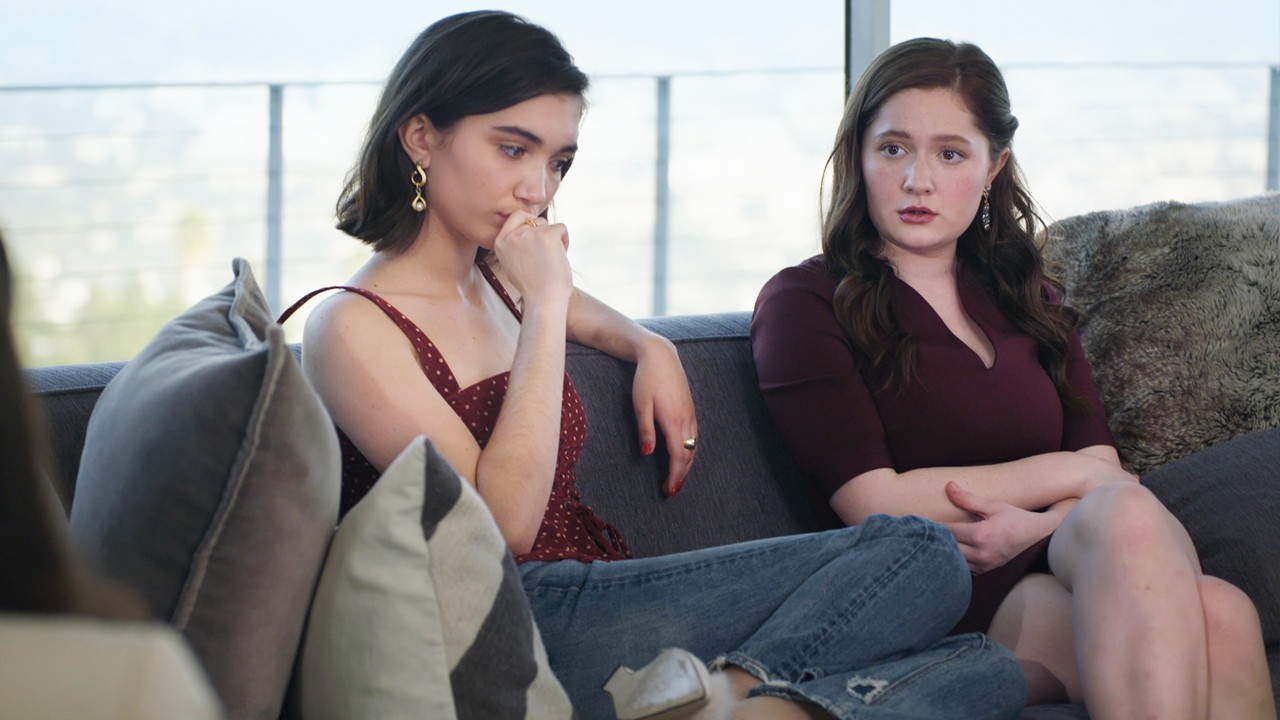Photo via 'The Predator' (2018) stills.
On Thursday, as if to remind us just how chemically unstable Hollywood has become (or rather, has always been), the Los Angeles Times reported a sad, titular irony. The entire cast of The Predator—the surefire sci-fi blockbuster, rebooted and directed by Shane Black, which would open at the Toronto International Film Festival—had been unwittingly working with a sex offender. Yes, and the actress Olivia Munn had shared a fleeting scene with Steven Wilder Striegel, who, in 2010, had pleaded guilty to charges of attempting to lure a 14-year-old girl into a sexual relationship via email. (Striegel was 38 at the time. He served six months in prison.)And so this moment, which is still unfolding in headlines, acts as yet another microcosm for the questions Hollywood has been struggling to answer since the #MeToo movement erupted ten months ago: Why do we value the careers of men over women? Why are sexual misconduct accusations only considered serious when they become PR nightmares? What might redemption look like (if it exists at all) for men who have been accused of sexual assault? How does silence make bystanders complicit in a system that enables sexual assault?This particular situation offers little promise of clarity, but I’ll try. Twentieth Century Fox was just days away from locking picture on The Predator when, shortly after being tipped off herself, Munn phoned in the report, and then proceeded to individually contact all of her co-stars; days later, the studio had excised the scene from the movie. Fox issued an apology, claiming it hadn’t been aware of Striegel’s record. (The studio claims the law prevents it from running background checks on actors.) But Black, on the other hand, who has casted Striegel in two prior films ( Iron Man 3 and The Nice Guys, if you’re curious), admitted he knew: “I personally chose to help a friend. I can understand others might disapprove, as his conviction was on a sensitive charge and not to be taken lightly,” he said.“It’s not an easy thing to be the one to speak up. There are people who get mad at you for not helping them bury it,” she told The Hollywood Reporter . “I’m sitting here by myself, when I should be with the rest of my cast.”
Twentieth Century Fox was just days away from locking picture on The Predator when, shortly after being tipped off herself, Munn phoned in the report, and then proceeded to individually contact all of her co-stars; days later, the studio had excised the scene from the movie. Fox issued an apology, claiming it hadn’t been aware of Striegel’s record. (The studio claims the law prevents it from running background checks on actors.) But Black, on the other hand, who has casted Striegel in two prior films ( Iron Man 3 and The Nice Guys, if you’re curious), admitted he knew: “I personally chose to help a friend. I can understand others might disapprove, as his conviction was on a sensitive charge and not to be taken lightly,” he said.“It’s not an easy thing to be the one to speak up. There are people who get mad at you for not helping them bury it,” she told The Hollywood Reporter . “I’m sitting here by myself, when I should be with the rest of my cast.” The insidious exile Munn has experienced as a result of her unfaltering vocality has brought into sharp focus the way men deposit the burden of sexual assault activism on the women who so often endure it. One particular interview—where Munn speaks passionately about #MeToo, and her co-stars, Trevante Rhodes and Augusto Aguilera, remain largely silent—inadvertently summarizes the very same infrastructure of male passivity that has allowed sexual misconduct to thrive and fester in the entertainment industry. “The #MeToo movement called out abusers. But they’re not the only ones in the wrong. Those who know about abuse and not only do nothing but continue to put abusers in positions of power are complicit,” Munn tweeted.The first of The Predator acting cohort to speak up was Sterling K. Brown, who hadn’t even attended TIFF, due to scheduling conflicts with his filming for This Is Us. “I’m sorry you’re feeling so isolated, my dear. And I’m sorry you’ve been the only one to speak up publicly,” Brown wrote in a long Twitter thread. “When someone has been convicted of a crime of a sexual nature involving a child, we have the right to say that’s not okay!”In November 2017, Munn was one of six women to come forward with allegations of sexual misconduct against director Brett Ratner. He had, allegedly, masturbated in front of her on set of his 2004 film, After the Sunset. The fact that Munn’s discomfort with Striegel’s presence on set needed any sort of validation to elicit empathy from her colleagues, and that only after Brown’s response did other co-stars digitally materialize with their own versions of apologies—Boyd Holbrook issued an apology yesterday, admitting to pulling out of press and noting the importance of hearing women—seems almost surreal. Declarations of male allyship have long girded the line of performative empathy. Silence has been its most toxic iteration.The popular contrarian response to Munn’s whistleblowing has been, oddly, to employ the language of criminal justice and adjudication. “As a registered sex offender, is his life supposed to be over? Is he supposed to never be employed again?” one man tweeted. “I don’t think that tossing someone with a minor role off the set because he’s on a sex offender registry is helpful to anyone really, though,” said another. Such answers, it seems, draw from the same font of defence that supported Louis C.K.’s sudden reemergence, two weeks ago, into the realm of comedy, after nine months of alleged transformative change. (“I have spent my long and lucky career talking and saying anything I want,” C.K. said in a November 2017 statement. “I will now step back and take a long time to listen.” It is unclear what the rubric for his rehabilitation was, nor how he might have fulfilled it.)I do not know that the question of when a man who has sexually assaulted a woman should be professionally absolved can be answered easily, let alone someone convicted of a sexual offence involving a minor. Certainly, to argue a point for redemption when we’ve only reached the front of an arc for reformative change seems terribly premature. What does restitution look like in a cultural moment populated by Weinsteins and Spaceys and Moonveses? Munn has said that, after her treatment here, she’s considering leaving acting and joked that, with her mother, she might open up a smoothie shop on a beach somewhere. Though wrapped in comedy, her discomfort is a testament to how men, throughout the #MeToo movement, have implicated women in their own shame.Follow Connor Garel on Twitter.Sign up for the VICE Canada Newsletter to get the best of VICE Canada delivered to your inbox.
The insidious exile Munn has experienced as a result of her unfaltering vocality has brought into sharp focus the way men deposit the burden of sexual assault activism on the women who so often endure it. One particular interview—where Munn speaks passionately about #MeToo, and her co-stars, Trevante Rhodes and Augusto Aguilera, remain largely silent—inadvertently summarizes the very same infrastructure of male passivity that has allowed sexual misconduct to thrive and fester in the entertainment industry. “The #MeToo movement called out abusers. But they’re not the only ones in the wrong. Those who know about abuse and not only do nothing but continue to put abusers in positions of power are complicit,” Munn tweeted.The first of The Predator acting cohort to speak up was Sterling K. Brown, who hadn’t even attended TIFF, due to scheduling conflicts with his filming for This Is Us. “I’m sorry you’re feeling so isolated, my dear. And I’m sorry you’ve been the only one to speak up publicly,” Brown wrote in a long Twitter thread. “When someone has been convicted of a crime of a sexual nature involving a child, we have the right to say that’s not okay!”In November 2017, Munn was one of six women to come forward with allegations of sexual misconduct against director Brett Ratner. He had, allegedly, masturbated in front of her on set of his 2004 film, After the Sunset. The fact that Munn’s discomfort with Striegel’s presence on set needed any sort of validation to elicit empathy from her colleagues, and that only after Brown’s response did other co-stars digitally materialize with their own versions of apologies—Boyd Holbrook issued an apology yesterday, admitting to pulling out of press and noting the importance of hearing women—seems almost surreal. Declarations of male allyship have long girded the line of performative empathy. Silence has been its most toxic iteration.The popular contrarian response to Munn’s whistleblowing has been, oddly, to employ the language of criminal justice and adjudication. “As a registered sex offender, is his life supposed to be over? Is he supposed to never be employed again?” one man tweeted. “I don’t think that tossing someone with a minor role off the set because he’s on a sex offender registry is helpful to anyone really, though,” said another. Such answers, it seems, draw from the same font of defence that supported Louis C.K.’s sudden reemergence, two weeks ago, into the realm of comedy, after nine months of alleged transformative change. (“I have spent my long and lucky career talking and saying anything I want,” C.K. said in a November 2017 statement. “I will now step back and take a long time to listen.” It is unclear what the rubric for his rehabilitation was, nor how he might have fulfilled it.)I do not know that the question of when a man who has sexually assaulted a woman should be professionally absolved can be answered easily, let alone someone convicted of a sexual offence involving a minor. Certainly, to argue a point for redemption when we’ve only reached the front of an arc for reformative change seems terribly premature. What does restitution look like in a cultural moment populated by Weinsteins and Spaceys and Moonveses? Munn has said that, after her treatment here, she’s considering leaving acting and joked that, with her mother, she might open up a smoothie shop on a beach somewhere. Though wrapped in comedy, her discomfort is a testament to how men, throughout the #MeToo movement, have implicated women in their own shame.Follow Connor Garel on Twitter.Sign up for the VICE Canada Newsletter to get the best of VICE Canada delivered to your inbox.
Advertisement

The rest is rickety. After speaking on the record to the Times, Munn was, effectively, ostracized by her team. She heard nothing directly from Black, the studios, or her co-stars. At the premiere, the other actors gave Black a standing ovation. They cancelled interviews with her, leaving Munn to carry the press tour on her own. And at least one colleague, she says, walked out of an interview when the subject of the deleted scene came up. It was an ad hoc, internal blacklisting. Munn removed a predator from a film; she would certainly pay the price.
Advertisement

